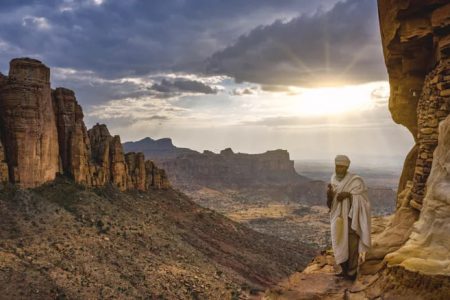By Chris Tharp via ISLANDS (December 13, 2024)
For any traveler serious about seeing the world, Africa is likely high on their list. There’s just one problem: where to begin? The world’s second-largest continent is home to 54 independent countries, which makes choosing a destination a dizzying endeavor. Africa offers up everything from the incomprehensible vastness of the Sahara to São Tomé and Príncipe, rarely-visited islands that have been called the “African Galapagos.” This is in addition to buzzing cities, wide savannas, mountains, jungles, and even Cape Winelands, a world-class wine region without the crowds.
Situated in the Horn of Africa, Ethiopia stands out as one of the continent’s most alluring destinations. With over 132 million people, Ethiopia is the second-most populous country in Africa, and has a fascinating and distinct history. Its main language, Amharic, is in the same family as Arabic and Hebrew, and the country is home to a heady mix of religions and spiritual traditions, including Islam, Animism, Judaism, and the Ethiopian Orthodox Church, one of the oldest branches of Christianity.
Ethiopia is also said to be the birthplace of coffee, a beverage that still holds a special place in local culture. This — combined with its peppery, unique cuisine served on the spongy, pancake-like injera bread — makes it a serious draw for lovers of food and drink. The country is also home to mysterious, historical towns and some of the most diverse landscapes in all of Africa, with deserts, deep valleys, and rugged highlands guaranteed to take your breath away.
Culture, coffee, and jazz
Most visitors to Ethiopia start off in the country’s bustling capital, Addis Ababa. This big kinetic burg manages to be one of Africa’s most modern centers while also never forgetting its rich cultural underpinnings.
While in town, check the National Museum of Ethiopia, which, in addition to artifacts and art, houses the skeletal remains of Lucy, a human ancestor that dates 3.2 million years. Learn about the country’s diverse ethnic groups at the Ethnological Museum — which occupies the former palace of Emperor Haile Selassie — or head to the not-to-be-missed Mercato. This sprawling, chaotic, street bazaar is said to be Africa’s largest open air market, and is awash with sights, sounds, and aromas that are nothing short of intoxicating.
Coffee is the name of the game in Ethiopia, so savor a cup of the country’s gift to the world at Tomoca, a cafe that has been in operation since 1953, or sip the goods at the highly-regarded Galani. Dive into a plate of injera, veggies, and spicy meat stews at the Yod Abyssinia Cultural Restaurant, which also features traditional music and dance. For a more modern take on tunes, check out African Jazz Village. Located in the Ghion Hotel, this venue focuses on Ethio-jazz, a hypnotic, homegrown, musical hybrid form that is famous around the world.
Mountains, deep valleys, and churches carved from stone

The landscape of Ethiopia tends to blow minds, and one place that delivers on this promise is the Danakil Depression. Created by three continental plates drifting apart, this otherworldly zone lies 377 feet below sea level and features salt flats, geysers, volcanoes, and entire lakes made of lava. It’s also one of the hottest places on the planet, with thermometer-busting temperatures reaching up to 131 degrees Fahrenheit.
It’s the highlands that really define the country, and one of the best ways to experience them is by trekking in the Simien Mountains. This range of ridges and 14,000-foot peaks offers the most sweeping views in the country, and can be explored via two ecolodges: Simien Lodge and Limalimo Lodge. For more of nature’s pure spectacle, head into the Rift Valley, a geological formation that’s famous for its string of lakes that are home to African wildlife such as hippos and crocodiles.
For history and architecture, look no further than Gonder. Sometimes called the “Camelot of Ethiopia,” this former capital city features castle ruins that rival any in Europe, as well as one of the nation’s most well-known churches, Debre Birhan Selassie. However, when it comes to Ethiopian houses of worship, Lalibela is the undisputed king. This legendary town is home to 13 churches hewn from rock. They are still vital places of worship, playing host to the country’s most important — and sacred — religious festivals. If you’re looking for even more historical sites in awe-inspiring landscapes, Tunisia is the perfect desert escape.
